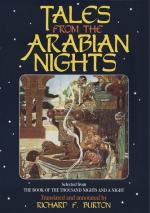[FN#173] The planet Mars.
[FN#174] The Asiatics have a very contemptible opinion of the Russians, especially of the females, whom they believe to be void of common modesty. Our early European voyagers have expressed the same idea.—Scott.
[FN#175] i.e. having enjoyed the woman.—R.F.B.
[FN#176] The reader will doubtless recollect the resemblance which the plot of this lesson bears to Pope’s January and May, and to one of Fontaine’s Tales. Eenaiut Olla acknowledges his having borrowed it from the Brahmins, from whom it may have travelled through some voyage to Europe many centuries past, or probably having been translated in Arabic or Persian, been brought by some crusader, as were many Asiatic romances, which have served as the groundwork of many of our old stories and poems.—Scott.
[FN#177] In Scott (vi. 352) “Adventures of Aleefa and Eusuff.” This long and somewhat longsome history is by another pen, which is distinguished from the ordinary text by constant attempts at fine writing, patches of Saj’a or prose-rhyme and profuse poetry, mostly doggerel. I recommend it to the student as typically Arabian with its preponderance of verse over prose, its threadbare patches made to look meaner by the purpureus pannus; its immoderate repetition and its utter disregard of order and sequence. For the rest it is unedited and it strikes me as a sketch of adventure calculated to charm the Fellah-audience of a coffee-house, whose delight would be brightened by the normal accompaniment of a tambourine or a Rababah, the one-stringed viol.
[FN#178] This P. N. has occurred in vol. vi. 8, where I have warned readers that it must not be confounded with the title “Maharaj"=Great Rajah. Scott (vi. 352) writes “Mherejaun,” and Gauttier (vi. 380) “Myr-djyhan” (Mir Jahan=Lord Life).
[FN#179] I need not inform the civilised reader that this “feeling conception” is unknown except in tales.
[FN#180] i.e. “The Slim-waisted.” Scott (vi. 352) persistently corrupts the name to “Aleefa,” and Gauttier (vi. 380) follows suit with “Alifa.”
[FN#181] In text “Al-Istikhraj,” i.e. making “elegant extracts.”
[FN#182] These lines are the merest doggerel of a strolling Rawi, like all the pieces d’occasion in this Ms.
[FN#183] Which are still worse: two couplets rhyme in ani, and one in ali, which is not lawful.
[FN#184] In text “Dayr Nashshabah,” a fancy name.
[FN#185] So in text: the name is unknown to me; its lit. meaning would be, “of high-breasted Virgins.”




